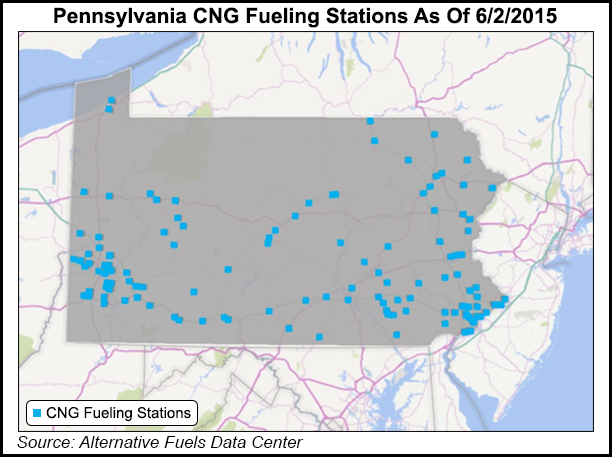Study Says Appalachian Shales to Support NatGas, Propane Transportation Growth
With natural gas and propane increasingly gaining a foothold as alternative fuel sources for Pennsylvania’s transportation sector thanks to ample supply from the Appalachian Basin’s Marcellus and Utica shales, a new study contends that conversion isn’t just for large fleets anymore.

According to “Opportunities to Use Natural Gas and Propane as a Transportation Fuel in Pennsylvania,” transit agencies and other large fleets across Pennsylvania are converting from gasoline to natural gas or propane because of cost and environmental benefits, but opportunities exist for small fleets or individual vehicles such as mid-size delivery vans and trucks, taxis and high-mileage commercial vehicles.
Using funds provided by the Pennsylvania Department of Community & Economic Development (DCED), the Shale Gas Innovation & Commercialization Center (SGICC) commissioned the 309-page study as an educational tool for Pennsylvanians on the options for fuel conversions, refueling options, and a summary of what is available in the market. Gannett Fleming authored the study, with assistance from the Ben Franklin Technology Partners of Central & Northern PA’s Transformation Business Services Network.
The study found that the natural gas and propane for the transportation market is slowly growing relative to the choices for available alternative fuel vehicles being provided by the major automobile manufacturers. It is also growing slowly due to the current lower price of crude oil. The price differential of a $1.50/gasoline gallon equivalent (GGE) from just over a year ago is now just about $0.86/GGE.
“We’ve been closely following the acceptance and conversion to the use of natural gas or propane in the United States’ transportation market — especially in our region over the last few years,” said SGICC Director Bill Hall. “There are many options available, which can create confusion and uncertainty. But, there are niche opportunities that definitely make economic sense for companies to switch to using natural gas or propane to power their vehicles even with the relatively low price of gasoline and diesel. It’s our intention to supply a resource that companies can use to educate themselves and help them consider the options.”
The study found that it is a worthwhile exercise for any fleet owner regardless of the size of the fleet vehicles to investigate the opportunities available to convert all or a portion of their fleet to natural gas or propane. “Most experts who are tracking the shale energy area believe we will see a long-term low cost availability of both natural gas and propane, especially in Pennsylvania,” the author said. “Of course, the price of gasoline or diesel may also remain lower than the recent high prices seen just a few years ago, as oil production also appears to benefit from the shale energy revolution. But the spread between natural gas and propane versus gasoline and diesel still remains large enough to behoove any fleet operator, and also individuals who are high mileage drivers to study their fuel choice options.”
Production in the basin has skyrocketed, going from 1.7 Bcf/d in the Marcellus in 2010 to a combined 19 Bcf/d from the Marcellus and Utica shales last month, according to the Energy Information Administration.
The study is posted on the SGICC web site at www.sgicc.org/dced-grant-white-papers.html.
© 2024 Natural Gas Intelligence. All rights reserved.
ISSN © 2577-9877 | ISSN © 2158-8023 |
